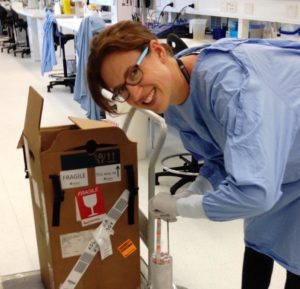
Eating a biscuit fortified with resistant starch every day could prove a low-cost way to reduce infant mortality rates from malnutrition and common diseases around the world.
The answer could lie in maximising the efficiency of babies’ and children’s digestive systems with this special type of dietary fibre, say Flinders University researchers.
The global gastrointestinal health project is investigating how bacteria in the large intestine affect the utilisation of food, and whether improving gut health might help babies and children to flourish on an impoverished diet and survive common diseases.
Malnutrition and diarrhoea cause millions of deaths in developing countries, leading to an earlier Bill & Melinda Gates Foundation-funded project at Flinders into the benefits of resistant starch and zinc absorption in children’s diets in Africa.
The chief investigator, leading Australian gastrointestinal expert Professor Graeme Young, says the latest project is focusing on whether young children have the gut bacteria required to produce small chain fatty acids from resistant starch.
“These fatty acids are important in assisting the healthy development in children and babies,” says Professor Young, from the Flinders Centre of Innovation in Cancer.
“Its conversion in the gut, however, is determined by many factors and is very different from children in Australia because of the environment, type of birth and the microflora of the mother.”
Under a Flinders School of Medicine partnership with the University of Malawi, researchers are testing small stool samples taken from the nappies of very young infants in a remote village near the country’s Mozambique border.
The project manager and Flinders graduate in nutrition and dietetics, Elissa Mortimer, travelled to Malawi in November 2015 to coordinate the field study with a local research partner, Dr Kondwani Katundu.
Ms Mortimer says the research is focusing on the colonic microbiome of babies of pre-weaning age to test whether they too have the capacity to benefit from resistant starch in their mother’s diet.
“It was believed for a long time that young children did not have the bacteria required to ferment resistant starch, but more recent studies have shown otherwise,” she says.
“Our project, along with others in low-middle income countries around the world, will determine if infants can ferment resistant starch.”
At the South Australian Health and Medical Research Institute, a laboratory team led by Associate Professor Geraint Rogers and his Flinders University team, and are measuring the number and type of bacteria, short chain fatty acids and pH from the samples.
Flinders’ global gastrointestinal health team is now working with the Gates Foundation-USAID Grand Challenge India for a study of how resistant starch assists nutritional and other health status when fed to young children or women of childbearing age.
In Africa, India and other low-income countries, more than 50% of deaths in children under the age of 5 years can be attributed to undernutrition.
Malawian research partner Dr Katundu this month visited Adelaide to discuss the African project.
Following analysis of the laboratory assays, bioinformatics experts will determine whether the African infants can ferment resistant starch.
This will help to use resistant starch in simple foods, such as biscuits or bread, to counter severe fluid loss and dehydration during acute gastrointestinal infection in children and to increase energy and nutrient absorption from their diet.

